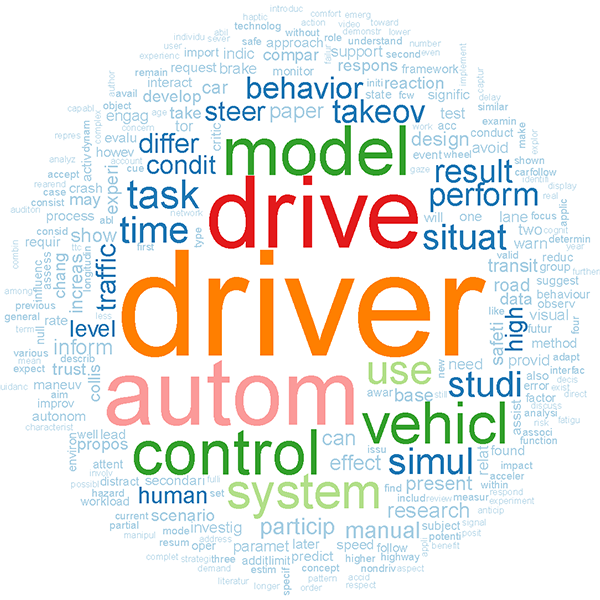
Abstract
Automated and connected vehicle technologies, like truck platoons, offer tremendous promise for driving safety, efficiency, and productivity. Some projections even go as far as to suggest that these technologies will eliminate all traffic fatalities. However, the benefits of these technologies will only be realized if they are designed for the human beings that interact with them. This interaction is particularly significant in cases where automation fails or hits an operational limit, where drivers may unexpectedly be asked to resume control of the vehicle often with little time to re-engage and react before a crash. One method of alleviating these problematic transitions is to integrate models of human behavior directly into the design process. The models can be used to predict human reactions and differentiate between scenarios where the driver can recover safely, and those where a crash is likely to occur. In this project, we develop a model of human behavior during automation failures that may be integrated into current and future design processes for automated vehicles. We will use this model to generate a set of design guidelines for future automated vehicles following technologies that will promote safety and reduce automated driving crashes.
Project Highlights
- Published a well-cited literature review on automated vehicle takeover studies and modeling paradigms. The review identified visual-looming-based evidence-accumulation models as a promising direction.
- Developed driver maneuver prediction algorithm during SHRP2 rear-end crashes and near-crashes that achieved 96% accuracy
- Created a driving simulation dataset of responses to silent and alerted automation failures in a platooning scenario in critical and non-critical scenarios. Found that scenario criticality influenced takeover performance more than alert type.
Final Report
EWD & T2 Products
Student Impact Statement – Hananeh Alambeigi and Srinivas Tankasala Cara Stotz, (pdf): The student(s) working on this project provided an impact statement describing what the project allowed them to learn/do/practice and how it benefited their education.
Two simulator tours were given by Hananeh Alambeigi, one to Middle and High school prospective students during Aggieland Saturday and the other at Texas A&M College of Engineering Administration.
Webinar: McDonald, A.D., Sarkar, A. (2021). Modeling Driver Behavior during Automated Vehicle Platooning Failures. US Department of Transportation SAFE-D National Transportation Center Webinar Series, February 23, 2021.
Presentations/Publications
Alambeigi, H. & McDonald, A.D. (2020). Modeling post-takeover avoidance and stabilization steering control in automated vehicles. Submitted to the Annual meeting of the HFES.
Alambeigi, H., McDonald, A.D. (2021). A Bayesian regression analysis of the effects of alert presence and scenario criticality on automated vehicle takeover performance. Human Factors: The Journal of the Human Factors and Ergonomics Society. Accepted.
Sarkar, A., Hickman, J.S., McDonald, A.D., Huang, W., Vogelpohl, T., and Markkula, G. (2021). Steering or braking avoidance response in SHRP2 rear-end crashes and near-crashes: A decision tree approach. Accident Analysis and Prevention. Accepted.
McDonald, A.D., Alambeigi, H., Engstrom, J., Markkula, G., Vogelpohl, T., Dunne, J., and Yuma, N. (2019). Towards computational simulations of behavior during automated driving take-overs: A review of the empirical and modeling literature. Human Factors: The Journal of the Human Factors and Ergonomics Society, 61(4).
Alambeigi, H., McDonald, A.D. (2020). Modeling post-takeover avoidance and stabilization steering control in automated vehicles. Presented at the Human Factors and Ergonomics Society’s 2020 International Annual Meeting, Virtual, October 2020.
Alambeigi, H., McDonald, A.D., and Tankasala, R. (2020). Crash themes in automated vehicles: A topic modeling analysis of the California Department of Motor Vehicles Automated Vehicle Crash Database. Presented at the 99th Annual Meeting of the Transportation Research Board. Washington, D.C. January 2020.
McDonald, A.D. (2020). The human side of transportation AI. Presented during the US Department of Transportation’s Getting to Know AI Webinar series. October 1, 2020.
McDonald, A.D. (2020). Understanding and modeling driver behavior after automated vehicle failures. University of Massachusetts Amherst, October 23, 2020.
McDonald, A.D., Sarkar, A. (2021). Modeling Driver Behavior during Automated Vehicle Platooning Failures. US Department of Transportation SAFE-D National Transportation Center Webinar Series, February 23, 2021.
Final Dataset
The final datasets for this project are located in the Safe-D Collection on the VTTI Dataverse; DOI: 10.15787/VTT1/C76VBC.
Research Investigators (PI*)
Tony McDonald (TTI/TAMU)*
Abhijit Sarkar (VTTI)
Andrew Miller (VTTI)
Jeff Hickman (VTTI)
Hananeh Alambeigi (TAMU)
Project Information
Start Date: 1/1/2018
End Date: 12/31/2020
Status: Complete
Grant Number: 69A3551747115
Total Funding: $353,915
Source Organization: Safe-D National UTC
Project Number: 03-036
Presentations/Publications
McDonald AD, Alambeigi H, Engstrom J, et al. Toward Computational Simulations of Behavior During Automated Driving Takeovers: A Review of the Empirical and Modeling Literatures. Hum Factors J Hum Factors Ergon Soc 2019. doi:10.1177/0018720819829572 (Published)
Safe-D Theme Areas
Automated Vehicles
Connected Vehicles
Safe-D Application Areas
Driver Factors and Interfaces
Vehicle Technology
More Information
Sponsor Organization
Office of the Assistant Secretary for Research and Technology
University Transportation Centers Program
Department of Transportation
Washington, DC 20590 United States
Performing Organization
Texas A&M University
Texas A&M Transportation Institute
3135 TAMU
College Station, Texas 77843-3135
USA
Virginia Polytechnic Institute and State University
Virginia Tech Transportation Institute
3500 Transportation Research Plaza
Blacksburg, Virginia 24061
USA
